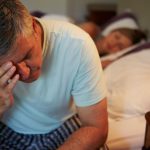 As of 2012, one in 10 Americans has experienced bouts of depression. This number is estimated to increase by 20 percent each year. Sadly, though, up to 80 percent of these people are not receiving treatment for their depression, whether they are scared to ask for help or are not able to do so, factors are in place preventing treatment from being carried out.
As of 2012, one in 10 Americans has experienced bouts of depression. This number is estimated to increase by 20 percent each year. Sadly, though, up to 80 percent of these people are not receiving treatment for their depression, whether they are scared to ask for help or are not able to do so, factors are in place preventing treatment from being carried out.
With depression on the rise, it is important we inform ourselves about the mental disease so we can have a better understanding and be more open to discussing it and seeking treatment. Depression doesn’t just affect the mind – the long-term effects of depression can greatly impact the body as well. The physical effects of depression on our body are enough to hinder our overall health.
So when you think about depression, also know that there is a definitive link between depression and physical symptoms as well. To understand depression, is to also recognize the side effects of depression and how they can affect the body.
What Causes Depression?
Advertisement
 An exact cause of depression is still unknown, but researchers have compiled a few factors which could contribute to the onset of depression. These factors include:
An exact cause of depression is still unknown, but researchers have compiled a few factors which could contribute to the onset of depression. These factors include:
Causes of depression
- Biological differences: Physical changes to the brain
- Brain chemistry: Neurotransmitters are out of balance
- Hormones: Unbalance of hormones within the body
- Inherited traits: Family history of depression puts a person at higher risk for depression, although the gene is still unknown
- Life events: Trauma, stress, and loss may contribute to depression
Depression is most commonly found in teens, but it can start at any age. Women are more generally diagnosed with depression than men. Although this may have to do with the fact that women seek out help and medical advice more so than men do.
Alternative factors which can put a person at higher risk to develop depression are the following:
- Substance abuse
- Personality disorders
- Chronic illness
- Traumatic or stressful events
These are all factors to consider when trying to diagnose depression and considering appropriate treatment. Although it may appear that depression has a lot to do with the brain, physical effects of depression are a very real concern.
Physical Effects of Depression on the Body
 The link between depression and physical symptoms is well noted in medicine. Some of the most common side effects of depression include:
The link between depression and physical symptoms is well noted in medicine. Some of the most common side effects of depression include:
- Increase in physical pain
- Chronic fatigue
- Low libido
- Low appetite
- Lack of sleep or an increase in sleep
- Weight problems
Oftentimes, the physical effects of depression on our body can become easily dismissed among seniors because the effects can also be attributed to aging. This is why it is so important to spot the difference between signs of aging and side effects of depression.
Increase in Physical Pain
Among the physical effects of depression on our body are physical aches and pains. These aches and pains are often unexplainable and occur in about two out of three patients who have depression. A vicious cycle occurs whereas depression worsens so does the pain and when pain worsens so does the depression.
Chronic Fatigue
Similar to physical pain, there is a cycle of fatigue and depression as the two feed each other. Fatigue in depression may be a result of sleep problems, diet, stress, and even some medications aimed at treating depression may cause fatigue.
Low Libido
Several studies have looked at the link between depression and low libido. Low libido and depression have many similar risk factors and with depression, patients tend to have poorer health. Lack of circulation, smoking habits, and unhealthy diets can all contribute to low libido. Furthermore, if you are depressed you are in a state of unhappiness and low energy which are key factors to libido.
Effects of Depression on Nervous System
Our nervous system encounters many side effects of depression, including lack of concentration, feelings of hopelessness, being unable to perform normal everyday tasks, and loss of interest in things they once loved or life in general.
As a means of coping with these feelings and side effects of depression, a person may reach for substances for relief – but self-treating can very easily become self-harming. In fact, abusing substances as a means of self-treatment can only worsen the depression and solidify the long-term effects of depression.
Effects of Depression on Appetite
Our digestive system also experiences physiological effects of depression because a depressed person will start to eat much less, disrupting their intake of essential nutrients. If the digestive system doesn’t receive these nutrients it cannot fuel the body, leading to physical effects of depression on our body. Changes in eating habits can also disrupt already pre-existing health problems, such as diabetes, and can further cause constipation, diarrhea, and other stomach-related issues.
Eating habits may change as a result of depression as a person may be too fatigued or not feel well enough to eat. And without proper nutrition feelings of depression can worsen. On the other hand, some patients may engage in emotional eating but not as a result of hunger.
Sleep and Depression
Poor sleep may contribute to depression or depression may contribute to poor sleep. Some believe that poor sleep and depression share similar biological and risk factors and so both ailments may respond well to similar treatment options. A person with depression may experience difficulty falling asleep, staying asleep, oversleeping, or too little sleep.
Weight Problems
Weight problems in depression can occur for a variety of reasons including malnutrition, overeating, poor sleep, lack of physical activity, and other underlying issues which come along with depression. This can result in weight gain or weight loss completely unintentional to the individual.
Depression and the Cardiovascular System
Physiological effects of depression can occur in the cardiovascular system. Given the strong ties between stress and depression, an increase in stress over a long period of time can result in negative side effects of depression. Stress speeds up the heartbeat and constricts blood vessels, preventing the normal flow of blood. The long-term effect of depression on the cardiovascular system is heart disease.
Harvard Medical School found that among those who were hospitalized for depression, they were also two to five times more likely to have chest pains as well. This only reaffirms the physiological effects of depression.
Long-term effects of depression on the immune system
 Out of the biggest systems in the body to experience long-term effects of depression is the immune system. Because depression also causes high levels of stress, stress essentially eats away at the body weakening the immune system.
Out of the biggest systems in the body to experience long-term effects of depression is the immune system. Because depression also causes high levels of stress, stress essentially eats away at the body weakening the immune system.
When our immune system is weak, it cannot fight off illnesses, so those with depression are more likely to experience chronic illness. Worse yet, people with depression have a lower chance of being protected by receiving a vaccination as their immune system is too weak to form the antibodies it needs.
Furthermore, the physical effects of depression on our body, like lack of sleep, also work to weaken the immune system. When we don’t sleep, we become restless and our body can’t restore itself.
If someone with depression and lack of sleep also has a pre-existing illness, this illness can become worse. And lack of sleep can also worsen the depression as well. The vicious cycle that depression and lack of sleep cause on the immune system make for a very unhealthy person who simply cannot bounce out of it.
Depression Increases Risk of Atrial Fibrillation
It has been studied that people with depression have a higher risk of atrial fibrillation which is known to increase the risk of stroke. With such findings, doctors should not only aim at treating patients depression but encouraging them to practice heart-healthy lifestyle habits in order to protect their heart. Study lead investigator Parveen Garg explained, “Our findings identify a large portion of Americans who may be at an increased risk for developing atrial fibrillation and who may benefit from more targeted efforts to prevent this arrhythmia. If our findings are affirmed in future studies, especially those that formally assess for clinical depression, then we will need to see if treating depression may, in fact, lower the risk for atrial fibrillation.”
Depression and Brain Inflammation
A study uncovered that chronic depression can alter the brain. The longer depression goes untreated the higher the risk of brain inflammation. More so if a person has had depression for over a decade versus someone with depression less than a decade. Senior author of the study Dr. Jeff Meyer explained, “Greater inflammation in the brain is a common response with degenerative brain diseases as they progress, such as with Alzheimer’s disease and Parkinson´s disease.”
Depression Increases the Risk of Arthritis
A set of researchers sought to examine just this and to determine how varying levels of depression affect arthritis rates in the older population. The participants were separated into a control group and three experimental groups based on mild, moderate, or severe depressive symptoms.
The researchers found higher rates of arthritis in all three experimental groups compared to the control group. Those with mild symptoms showed an increased prevalence of 55 percent, moderate symptoms related to an increase of 62.9 percent, and severe depressive symptoms increased the prevalence of arthritis by 67.8 percent. The highest prevalence was found in the age group between 50 and 69 years of age.
Combating depression and reducing side effects of depression
Seeking professional treatment is key to reduce the physical and physiological effects of depression. Having the courage to combat depression is the first step to the road of recovery and not only getting your mind back but your body as well.
Advertisement
The physical effects of depression on our body can truly take a toll and inhibit us from doing the things we love. Likewise, the physiological effects of depression can harm us from the inside out. The only way to deter the long-term effects of depression from occurring is to take a stance today and opt for treatment.
Having a tight support group is a good place to start. Feeling comfortable and opening up to loved ones is the stepping stone to bringing you to that next level of recovery. Your mind, and body, will thank you if you do.
Also read:
